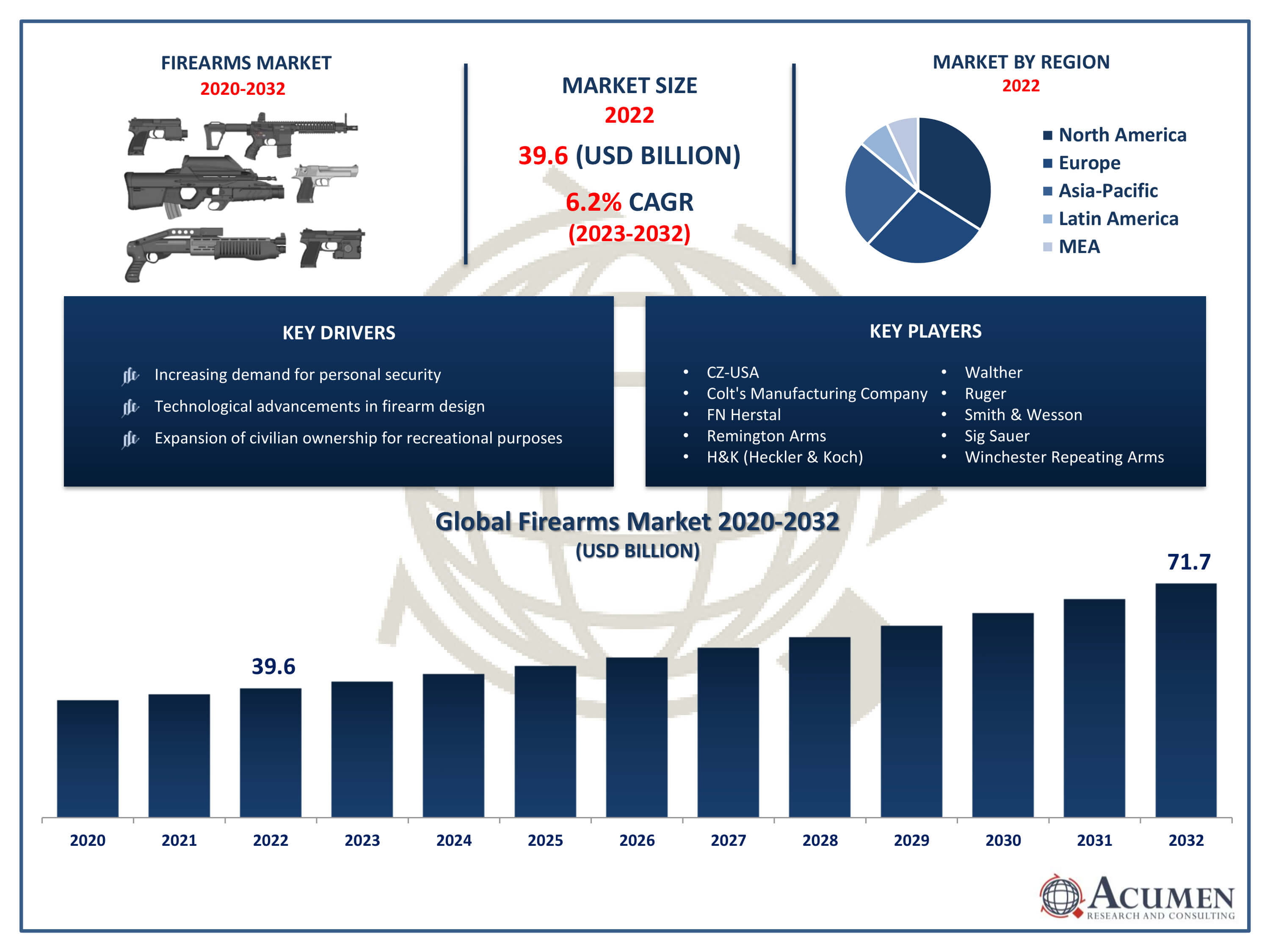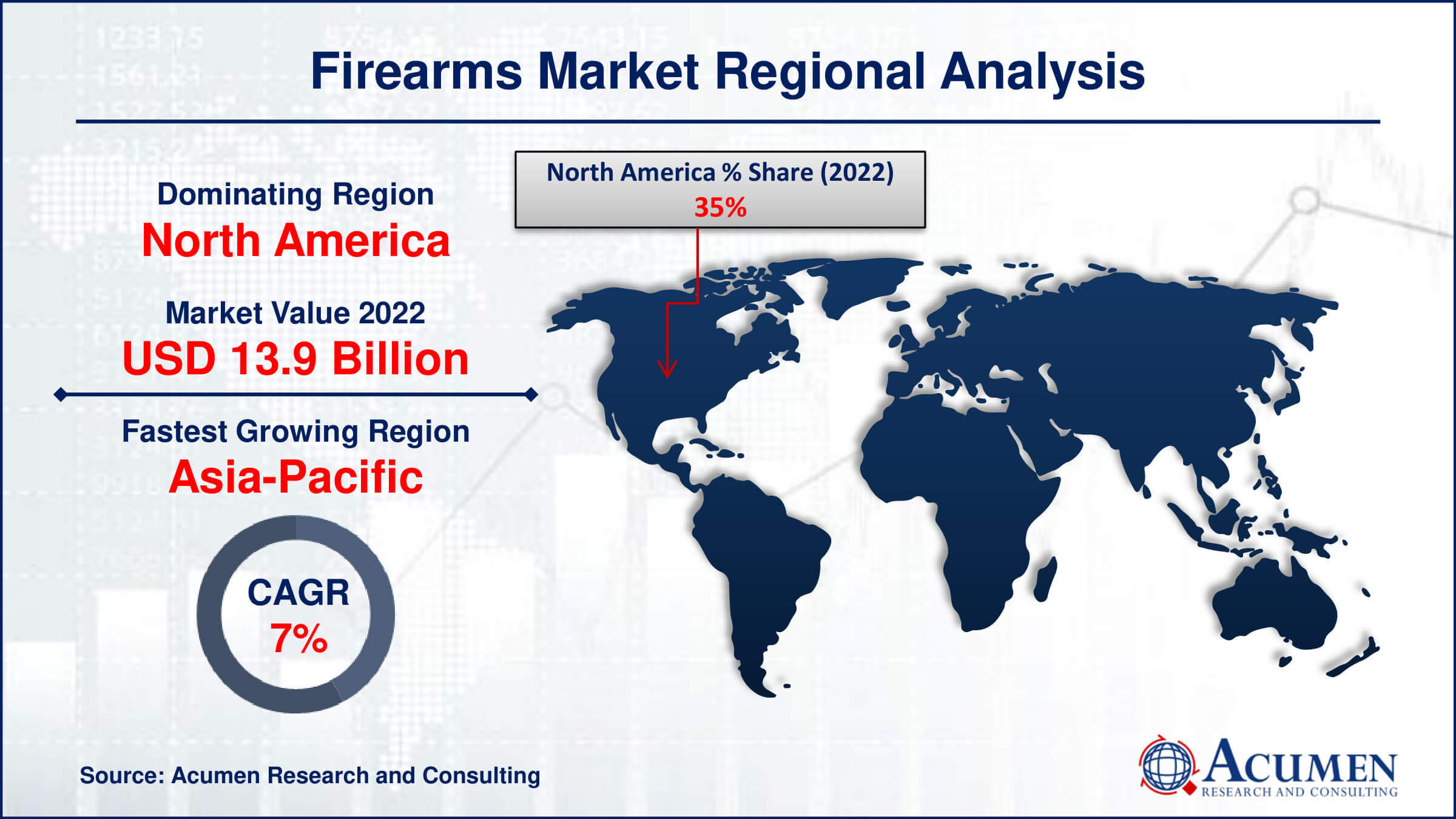Firearms Market | Acumen Research and Consulting
Firearms Market Size - Global Industry, Share, Analysis, Trends and Forecast 2023 - 2032
Published :
Report ID:
Pages :
Format : ![]()
The Firearms Market Size accounted for USD 39.6 Billion in 2022 and is projected to achieve a market size of USD 71.7 Billion by 2032 growing at a CAGR of 6.2% from 2023 to 2032.
Firearms Market Highlights
- Global firearms market revenue is expected to increase by USD 71.7 Billion by 2032, with a 6.2% CAGR from 2023 to 2032
- North America region led with more than 35% of firearms market share in 2022
- Asia-Pacific firearms market growth will record a CAGR of more than 6.9% from 2023 to 2032
- By product, the handguns segment captured more than 28% of revenue share in 2022.
- By end-use, the personal protection segment is projected to expand at the fastest CAGR over the projected period
- Increasing demand for personal security and self-defense, drives the firearms market value

Firearms refer to portable weapons that use explosive materials to propel a projectile. These weapons come in various forms, including handguns, rifles, shotguns, and automatic firearms. They serve purposes ranging from self-defense and law enforcement to hunting and recreational shooting. The firearms industry encompasses manufacturers, distributors, retailers, and consumers, creating a complex ecosystem driven by factors such as regulation, technological advancements, and societal trends.
The firearms market has seen notable growth over the past few decades, driven by factors such as increasing demand for personal security, expanding civilian ownership for recreational purposes, and robust military and law enforcement procurement. Additionally, advancements in firearm technology, including materials, ergonomics, and optics, have contributed to the market's expansion. Furthermore, geopolitical tensions and concerns about global security have stimulated government spending on defense and law enforcement, driving further growth in the firearms industry. Despite periodic fluctuations due to regulatory changes and public opinion shifts, the firearms industry has generally exhibited resilience and maintained a steady growth trajectory.
Global Firearms Market Trends
Market Drivers
- Increasing demand for personal security
- Technological advancements in firearm design
- Expansion of civilian ownership for recreational purposes
- Rising government spending on defense and law enforcement
- Geopolitical tensions driving military procurement
Market Restraints
- Growing concerns about gun violence and calls for stricter regulation
- Regulatory challenges impacting distribution and sales
Market Opportunities
- Development of safety features and smart technologies
- Expansion of e-commerce platforms for firearms and accessories
Firearms Market Report Coverage
| Market | Firearms Market |
| Firearms Market Size 2022 | USD 39.6 Billion |
| Firearms Market Forecast 2032 |
USD 71.7 Billion |
| Firearms Market CAGR During 2023 - 2032 | 6.2% |
| Firearms Market Analysis Period | 2020 - 2032 |
| Firearms Market Base Year |
2022 |
| Firearms Market Forecast Data | 2023 - 2032 |
| Segments Covered | By Product, By Firing System, By End-Use, And By Geography |
| Regional Scope | North America, Europe, Asia Pacific, Latin America, and Middle East & Africa |
| Key Companies Profiled | CZ-USA, Colt's Manufacturing Company, FN Herstal, Remington Arms, H&K (Heckler & Koch), Walther, Ruger, Smith & Wesson, Sig Sauer, and Winchester Repeating Arms. |
| Report Coverage |
Market Trends, Drivers, Restraints, Competitive Analysis, Player Profiling, Covid-19 Analysis, Regulation Analysis |
Firearms are portable weapons designed to discharge a projectile using explosive force. They come in various forms such as handguns, rifles, shotguns, and automatic firearms. Firearms have been integral to human history, evolving from early black powder muskets to modern-day precision-engineered weapons. They serve a multitude of purposes, ranging from self-defense and law enforcement to hunting, sport shooting, and military combat. In self-defense and law enforcement, firearms provide individuals and organizations with a means to protect themselves and others from potential threats. Law enforcement agencies worldwide rely on firearms as essential tools for maintaining public safety and enforcing the law. Similarly, civilians may choose to own firearms for personal protection, particularly in regions with high crime rates or where individuals face perceived threats to their safety. Additionally, firearms play a crucial role in hunting, providing hunters with the means to pursue game animals for sustenance or sport.
The firearms market has experienced steady growth in recent years, fueled by a combination of factors such as increasing demand for personal security, expanding civilian ownership for recreational purposes, and robust military and law enforcement procurement. Technological advancements in firearm design, including materials, ergonomics, and optics, have further propelled market expansion. Additionally, geopolitical tensions and concerns about global security have led to significant government spending on defense and law enforcement, driving further growth in the firearms industry. These factors, combined with a resilient market ecosystem, have contributed to a positive growth trajectory for the firearms industry. Furthermore, the rise of e-commerce has transformed the distribution landscape, making firearms and accessories more accessible to consumers while presenting regulatory challenges for authorities. This shift towards online sales has opened up new opportunities for market expansion, especially in regions where traditional brick-and-mortar stores may be limited.
Firearms Market Segmentation
The global firearms market segmentation is based on product, firing system, end-use, and geography.
Firearms Market By Product
- Handguns
- Shotguns
- Rifles
- Machine Guns
- Bullpup Rifles
- Designated Marksman Rifles
- Others
According to the firearms industry analysis, the handguns segment accounted for the largest market share in 2022. This growth is driven by various factors including increasing demand for personal protection, concealed carry laws, and recreational shooting activities. Handguns are popular choices for self-defense due to their compact size, ease of use, and versatility. Moreover, advancements in handgun technology, such as improved ergonomics, lighter materials, and enhanced safety features, have contributed to their rising popularity among consumers. Additionally, changes in legislation and regulations have influenced the growth of the handguns segment. For instance, the relaxation of concealed carry laws in some regions has spurred demand for handguns among civilians seeking to exercise their right to bear arms for personal protection. Furthermore, the rise of shooting sports and competitive shooting events has boosted sales within this segment as enthusiasts seek high-performance handguns for target shooting and competition.
Firearms Market By Firing System
- Manual
- Automatic
- Semi-Automatic
- Break-action
- Others
In terms of firing systems, the automatic segment is expected to witness significant growth in the coming years. This growth is driven by factors such as increasing military and law enforcement procurement, technological advancements, and evolving consumer preferences. Automatic firearms, including submachine guns, assault rifles, and machine guns, are favored for their rapid-fire capabilities and effectiveness in combat situations. As global security concerns persist and modern warfare tactics evolve, demand for advanced automatic firearms remains robust, spurring market growth. Moreover, technological advancements have played a crucial role in the growth of the automatic firearms segment. Innovations such as improved firing mechanisms, enhanced durability, and integrated electronic systems have enhanced the performance and reliability of automatic firearms, making them more attractive to military and law enforcement agencies worldwide.
Firearms Market By End-Use
- Personal Protection
- Sport Shooting
- Hunting
- Military
- Law Enforcement
- Others
According to the firearms market forecast, the personal protection segment is expected to witness significant growth in the coming years. This growth is propelled by several factors, including rising concerns about personal safety, changing social dynamics, and legislative changes impacting firearm ownership regulations. As individuals seek means to protect themselves and their families, the demand for firearms specifically designed for personal protection purposes has surged. Furthermore, advancements in firearm technology have played a pivotal role in the growth of the personal protection segment. Manufacturers have introduced a wide range of handguns, shotguns, and compact firearms tailored for concealed carry and self-defense applications. These firearms often feature ergonomic designs, lightweight materials, and enhanced safety mechanisms to cater to the needs of individuals seeking reliable and easy-to-use options for personal protection.
Firearms Market Regional Outlook
North America
- U.S.
- Canada
Europe
- U.K.
- Germany
- France
- Spain
- Rest of Europe
Asia-Pacific
- India
- Japan
- China
- Australia
- South Korea
- Rest of Asia-Pacific
Latin America
- Brazil
- Mexico
- Rest of Latin America
The Middle East & Africa
- South Africa
- GCC Countries
- Rest of the Middle East & Africa (ME&A)

Firearms Market Regional Analysis
North America stands out as a dominating region in the firearms market due to a combination of historical, cultural, and regulatory factors. The United States, in particular, holds a prominent position within the global firearms industry, both as a significant producer and consumer of firearms. The region's long-standing tradition of gun ownership, dating back to its founding, has cultivated a robust firearms culture characterized by widespread civilian ownership, recreational shooting sports, and a strong emphasis on individual rights to bear arms. Additionally, North America boasts a diverse ecosystem of firearms manufacturers, ranging from established industry giants to innovative startups, catering to a wide range of consumer needs and preferences. The region's advanced manufacturing capabilities, coupled with a skilled workforce and access to cutting-edge technology, have positioned North American firearm manufacturers as leaders in innovation and quality within the global market. Furthermore, North America's regulatory environment, while subject to periodic debates and reforms, generally offers a favorable climate for firearms businesses compared to many other regions. The presence of well-defined legal frameworks governing firearm ownership and sales, combined with relatively permissive gun laws in certain jurisdictions, has facilitated the growth of the firearms market in North America.
Firearms Market Player
Some of the top firearms market companies offered in the professional report include CZ-USA, Colt's Manufacturing Company, FN Herstal, Remington Arms, H&K (Heckler & Koch), Walther, Ruger, Smith & Wesson, Sig Sauer, and Winchester Repeating Arms.
Frequently Asked Questions
How big is the firearms market?
The firearms market size was USD 39.6 Billion in 2022.
What is the CAGR of the global firearms market from 2023 to 2032?
The CAGR of firearms is 6.2% during the analysis period of 2023 to 2032.
Which are the key players in the firearms market?
The key players operating in the global market are including CZ-USA, Colt's Manufacturing Company, FN Herstal, Remington Arms, H&K (Heckler & Koch), Walther, Ruger, Smith & Wesson, Sig Sauer, and Winchester Repeating Arms.
Which region dominated the global firearms market share?
North America held the dominating position in firearms industry during the analysis period of 2023 to 2032.
Which region registered fastest CAGR from 2023 to 2032?
Asia-Pacific region exhibited fastest growing CAGR for market of firearms during the analysis period of 2023 to 2032.
What are the current trends and dynamics in the global firearms industry?
The current trends and dynamics in the firearms industry include increasing demand for personal security, technological advancements in firearm design, and expansion of civilian ownership for recreational purposes.
Which product held the maximum share in 2022?
The handguns product held the maximum share of the firearms industry.


